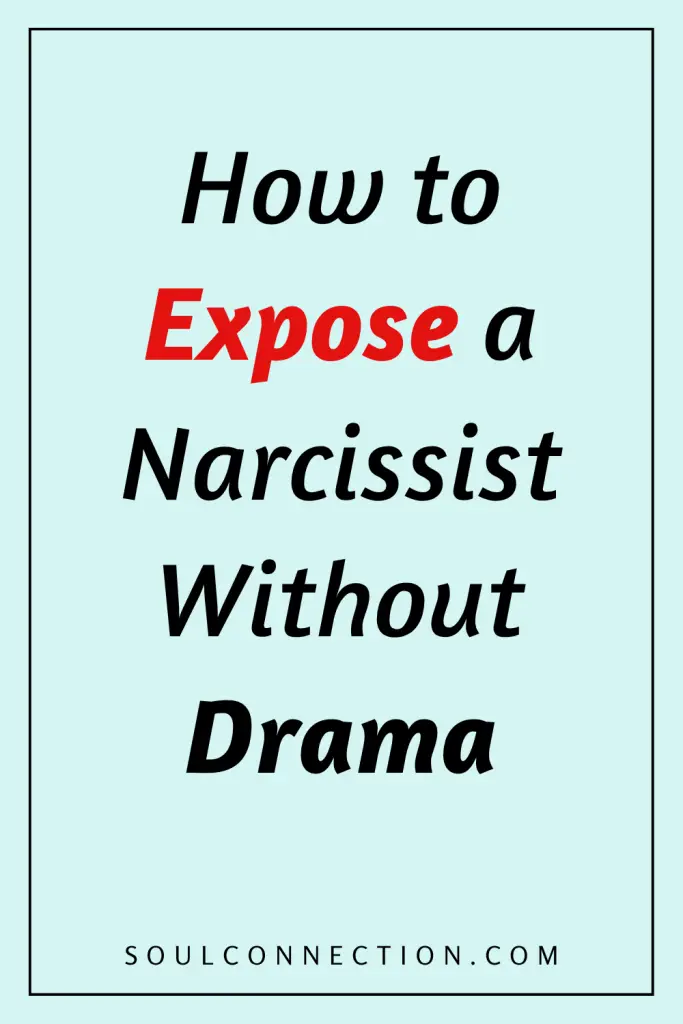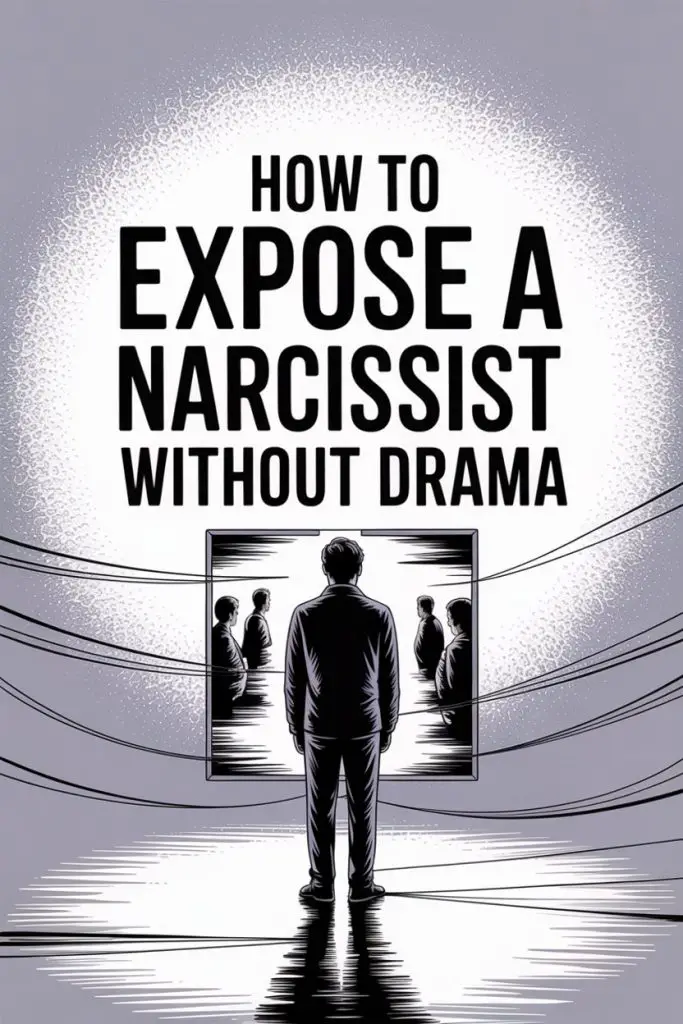Ah, narcissists. The universe’s gift to anyone who enjoys walking on eggshells sprinkled with emotional landmines.
If you’re reading this, you’ve probably been accused of “being too sensitive” more times than you’ve misplaced your car keys.
Now you’ve reached the point where just keeping the peace isn’t cutting it—but neither is pulling the pin on a family-wide explosion.
Is it possible to reveal a narcissist’s true colors without setting the house on fire? Absolutely. (Well, probably. But hey, at least the attempt will be entertaining.)
Here’s how to shine a light on narcissistic antics without descending into an episode of reality TV.
Spotting the Telltale Signs Before You Swing the Spotlight
Trying to expose a narcissist without knowing exactly what makes them tick is like trying to catch a fish with your bare hands. Sure, it looks doable on YouTube, but reality’s a bit slipperier.
Narcissists thrive on confusion. They’ll gaslight, reframe, blame-shift, and probably throw in a dramatic sigh for good measure.
Recognizing these patterns (think “Remember last Tuesday? That never happened” or “You’re imagining things!”) is your first superpower. If you can spot the tactics, you can plan your moves instead of falling for the same old song and dance.
Keep Your Cool—Seriously
Easier said than done, especially when someone’s rewriting history while standing in front of you. But here’s the secret: narcissists feed off emotional reactions. The more ruffled you look, the more they preen.
Stay calm. No, not the “I’m-bottling-it-all-up-and-will-explode-later” kind of calm. The “I’m-so-unbothered-it’s-suspicious” calm. Practice your poker face.
Imagine you’re being filmed for a documentary about people who don’t give a toss. When you refuse to react, their script falls flat.
Use Their Own Words—They’ll Love That
There’s something deeply satisfying about quoting a narcissist to themselves. Nothing says “I’m onto you” quite like, “Actually, you said exactly this last Thursday at 7:42 PM.” (Bonus points if you have a text or email. Receipts, baby.)
Stick to facts and direct quotes. No soapboxing. No grand speeches.
Just let their own words hang in the air. Watching them try to wriggle out of their own contradictions is better than Netflix.
Ask, Don’t Accuse
Marching in and declaring, “You’re a narcissist and everyone knows it!” rarely ends well. (Translation: get ready for tears, rage, or a performance worthy of an Oscar.) Instead, become a master of the pointed question.
For example:
- “When you said I’m too sensitive, what did you mean by that?”
- “You mentioned last week you’d handle the bills, but then you said it was my job. Can you help me understand?”
Questions force them to clarify (or squirm). They also put you in the driver’s seat—and make it harder for them to claim you’re attacking them.
Keep Witnesses in the Loop
One-on-one, a narcissist can spin stories faster than your washing machine on the heavy-duty cycle. But in front of others? Not quite as easy.
Whenever possible, involve another person in important conversations. Group texts, family meetings, or even just a visible CC on an email can do wonders.
Suddenly, their reality-bending skills don’t work as well.
If you’re not keen on dragging people into the fray, that’s fair. But sometimes just knowing someone else is present cuts down on the gaslighting by about eighty percent.
Document, Document, Document
Journals aren’t just for angsty teenagers and aspiring novelists. Keeping a running log of events, conversations, and promises is pure gold.
When things get messy (as they tend to), you’ll have a written record that lines up with reality—not the alternate universe your favorite narcissist is trying to create.
No need to share the journal unless the situation calls for it, but knowing you have proof can help you stand your ground.
Also, if you ever end up needing outside help (hello, therapy or mediation), having details at your fingertips saves a whole lot of “he said/she said.”
Set Boundaries—And Actually Hold Them
Exposing a narcissist isn’t just about showing others what’s going on; it’s about protecting yourself. Clear boundaries are your best friend.
No, they probably won’t like it. Yes, they’ll test you.
But boundaries are the difference between living in their world and inviting them—politely—to stay out of yours.
Examples:
- “I won’t discuss this with you if you raise your voice.”
- “I’m not comfortable with you criticizing me in front of friends.”
- “If you continue to insult me, I’ll leave the conversation.”
Stick to it. Every time. The pushback might be epic at first, but consistency is what exposes the real issue—narcissists hate limits.
Stay Focused on Behavior, Not Labels
Slapping the “narcissist” label on someone can backfire spectacularly. It distracts from what really matters: their actions.
Point out the behavior, not the diagnosis.
- “When you interrupted me just now, I felt dismissed.”
- “I noticed you keep changing the story about what happened last night.”
Keep it concrete, keep it boring, keep it real. They can argue about labels till the cows come home. They can’t argue with facts (well, they’ll try, but it’s less convincing).
Avoid the Drama Trap
Narcissists are the world’s greatest drama magnets. Arguing, yelling, door-slamming—these are their preferred habitats.
Refusing to play along is the ultimate power move. Respond with, “I see you’re upset. Let’s talk when things are calmer.”
Or just walk away. Quietly. No slamming, no tears, just an exit worthy of an ice queen.
Drama is fuel. Starve the engine, and you get silence—plus the satisfaction of not stooping to their level.
Rally Your Support Squad
Handling a narcissist solo is like trying to build IKEA furniture without the instructions or the Allen key. Friends, family, or a therapist can offer perspective, backup, and the occasional glass of wine.
Share your experiences with people you trust. (No, you’re not going mad. Yes, it is as weird as it feels.) Support doesn’t just make you feel better; it’s a subtle way to expose the narcissist’s behavior.
If multiple people notice the same patterns, the game changes.
When to Go Public (and When Not To)
Sometimes you reach a point where the truth simply has to come out. Maybe it’s at work, maybe it’s with family, maybe it’s on a group chat filled with emojis and passive-aggressive memes.
Only go public if it’s safe. Weigh the risks. If exposure puts you in harm’s way, or if it’s just going to inflame things with zero payoff, pause.
Sometimes the best exposure is simply stepping back, setting boundaries, and letting their behavior speak for itself.
If you do decide to shine a light, stick to the facts. No need for a dramatic monologue or a PowerPoint. The truth, plain and simple, is enough.
What Comes Next
Exposing a narcissist is not about revenge or getting a standing ovation from the crowd. It’s about clarity. It’s about no longer twisting yourself into knots to keep the peace or questioning your own reality.
Sometimes people will see what you see, and sometimes they won’t. That doesn’t mean you’re wrong. The goal isn’t to win them over; it’s to reclaim your own sanity.
Craving drama is their game. Refusing to play is yours.
Arm yourself with facts, boundaries, and a support network. Keep your head cool, your sense of humor intact, and your day-to-day life as peaceful as you can manage.
And if all else fails? Pour yourself a cuppa, take a breath, and remember: you’re not alone.
Even if it feels like everyone else is still buying tickets to the circus, at least you’ve stopped volunteering to be the main act.


